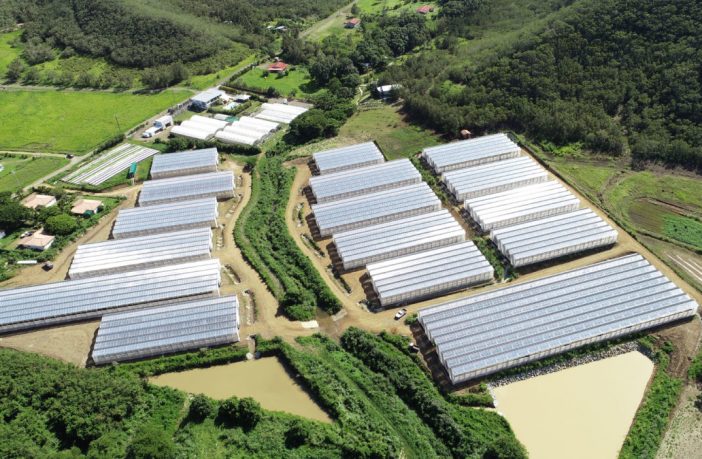- French renewables company Akuo Energy and the Enercal Energies Nouvelles subsidiary of New Caledonian electricity system operator Enercal have developed an agrivoltaic installation which will generate an estimated 2 GWh per year across 16 greenhouses.
The 22,000m² Focola project, conceived by farmer Jean-Christophe Niautou, is expected to improve annual crop yield which currently sits at an estimated 200 tons, notably by protecting plants from cyclones in the extreme-weather-proof structures.
“Beyond the technical prowess, this project contributes to two major societal ambitions: food self-sufficiency and electric self-sufficiency for this territory,” said Akuo.
New Caledonia, which depends heavily on coal and heavy fuel oil imports from Australia and New Zealand, has announced an ambition to source all its public power from renewables by 2030.
‘Unprecedented’
“This project, unprecedented in the Pacific zone, consolidates our position on island territories,” said Akuo president and co-founder Eric Scotto. “This technological prowess allows for [good-] quality agricultural activity while having a high pressure system essential for this territory, and also contributing to the creation of jobs in the region.”
Early last year, Enercal Energies Nouvelles commissioned the Wi Hache Ouatom installation, a 10 MW/7 MWh solar-plus-storage facility which will be the first of its kind in New Caledonia. At the end of the year, the Total Quadran renewables company owned by the French oil and gas major was finalizing its Hélio Boulouparis 2 project, which combines a 16 MW solar plant with a 10 MW/10.6 MWh storage system, and which will be an extension of the 11.2 MWp Hélio Boulouparis 1 project commissioned in May 2017.
Nicolas Cazé, technical director of Enercal Energies Nouvelles, said: “As the majority shareholder, Enercal Energies Nouvelles has provided its expertise and knowhow so that this project is adapted to local constraints and is fully in line with policy … on the energy transition. As the operator, we will ensure that the system is profitable and meets its electricity production targets. The first months of operation [have kept that]promise since the annual production target of 2 GWh was reached in eight months.”
Author: Catherine Rollet
This article was originally published in pv magazine and is republished with permission.















